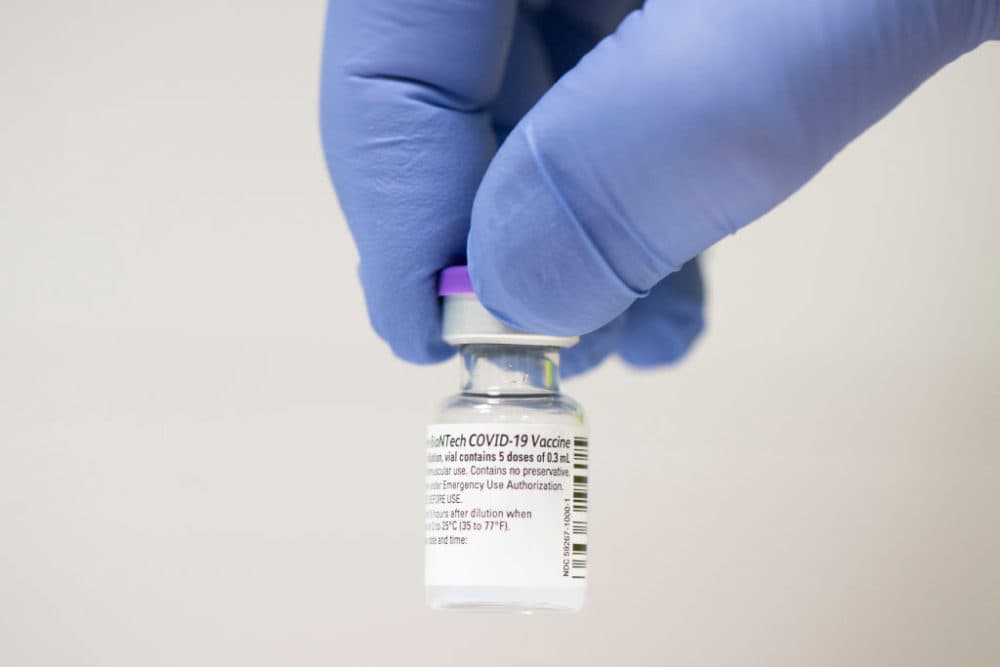Advertisement
Coronavirus Coverage
'The Light Is At The End Of The Tunnel': Experts Optimistic About Pfizer Vaccine Clinical Data

At the fastest pace in history, Pfizer’s coronavirus vaccine has come before the Food and Drug Administration. Regulators and independent advisors are meeting Thursday to discuss promising data from Pfizer’s clinical trials, and experts say they expect emergency use authorization to be granted.
“It’s not the end of the story of COVID,” says Dr. Philip Landrigan, an epidemiologist at Boston College. “But it’s the beginning of the end.”
The FDA released Pfizer’s phase three clinical data on Tuesday, along with an analysis that concluded the vaccine is safe and extremely effective. Of the 18,000 people who participated, 162 who received a placebo fell ill with COVID-19, but only eight who received the vaccine showed symptoms. That’s about a 95% effectiveness rate.
“This is astoundingly effective. I’m just so pleased,” says Dr. Christopher Gill, an immunologist at Boston University. “I was so excited to see the data, it just made me feel like the light is at the end of the tunnel. So great.”
Gill says the fact that Boston scientists did integral work on the vaccine makes the news even sweeter. Pfizer’s Andover campus has been a critical facility in the vaccine’s development and manufacture. And Moderna, a Cambridge-based biotech company has also submitted another, very similar coronavirus vaccine for FDA emergency authorization. The agency is expected to take up Moderna's application next week.
Massachusetts researchers were also key in developing the underlying experimental genetic technology that powers these vaccines.
“Let’s cheer for the hometown team on this one,” Gill says.
Although the positive results were not entirely unanticipated, as Pfizer had released preliminary data from its clinical trials over the fall, the full data delivered one pleasant surprise — a single shot appeared to provide some protection. A full course of the vaccine is still two shots, but Gill says the results were notable.
“That’s obviously terrific news because, logistically getting one dose of vaccine into 300 million people in the United States is quite challenging," Gill says. "Getting two doses in is much more challenging."
And while the FDA analysis suggested that uncomfortable side effects – like a headache, fatigue, nausea and soreness or pain at the injection site – occur in the vast majority of people who receive the vaccine, Gill says there was nothing in the safety profile that raised alarms. Because vaccine researchers ask participants if they have a headache, fatigue or any other specific symptoms every day for a week, many of those reported side effects may have nothing to do with the vaccine, he says.
“If I’d been vaccinated three days ago by Pfizer’s vaccine, and I wake up going, ‘oh, man, I feel achy and crummy,’ that’s like Christopher Gill any day of the year,” Gill says with a chuckle. “The most prominent thing that people got were sore shoulders.”
In the U.K., where the vaccine is now in use, two people experienced allergic reactions to the injection, prompting a warning from health officials that it should not be given to anyone with a history of severe allergies. Some trial participants have reported extreme fatigue and COVID-like symptoms such as chills, body aches and fever lasting about a day.
But when you consider the fact that contracting COVID-19 could lead to years of disability or death, the tradeoff of a sore shoulder, a headache or a couple days of fatigue is no big deal, says Dr. Lou Ann Bruno-Murtha, the division chief of infectious disease at Cambridge Health Alliance.
“And I don’t want to have to go to work and see patients and think I could bring COVID home. I don’t know if I’ll have a benign course, and I don’t like living that way,” she says. “I’d much rather take a vaccine and develop immunity.”
If everyone who is offered the opportunity to take the vaccine feels the same as she does, Bruno-Murtha says life will eventually return to normal. Massachusetts has rolled out a vaccination plan that prioritizes front-line health care workers and long-term care facilities. Vaccinations for the general public are not estimated to begin until April, at the earliest.
While it will be months before enough people are vaccinated to provide protection on a broad scale, even if both Moderna and Pfizer’s vaccines are approved this month, Bruno-Murtha says that’s likely far less time than it would take for the world to right itself without a vaccine.
This segment aired on December 10, 2020. The audio for this segment is not available.
